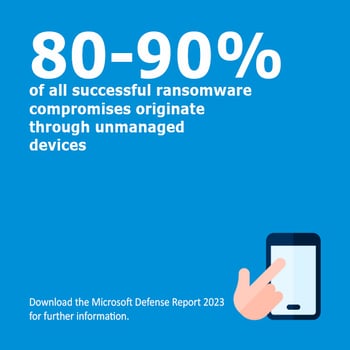Amidst the Covid-19 pandemic and its aftermath, we have witnessed a remarkable rise in remote workers. More and more individuals now choose to work from the comfort of their own homes. This shift not only reflects the changing times but also highlights the increasing appeal of remote work options.
This has had a profound impact on the IT infrastructure of companies and organisations, demanding substantial adjustments to support seamless connectivity, reliable communication, and secure data transmission across various remote work environments.
In today's ever-changing business landscape, it is paramount for organisations to prioritise investment in resilient and adaptable IT systems. These solutions must effectively address the evolving needs of remote workers, ensuring productivity and smooth operations in this new era of work.
So, let's explore the repercussions of this on the security of an organisation's IT infrastructure.
How does remote working increase cyber security risks?
The growing prevalence of remote workers, who conduct their tasks from various locations outside a traditional office setting, has brought about a significant de-centralisation of an organisation's IT infrastructure.
This shift indicates that the network, data storage systems, and other components of the IT infrastructure are dispersed across multiple locations, rather than confined to a centralised office environment. This enhances accessibility, resilience, and scalability while adapting to the evolving needs of modern businesses.
While it offers flexibility and convenience, this de-centralisation also introduces new challenges, specifically in terms of cyber security. With IT resources spread out and accessed by remote workers, the attack surface for potential security breaches increases exponentially.
Therefore, it becomes crucial for organisations to implement robust security measures and protocols to mitigate the heightened security risks associated with this decentralised IT infrastructure.
 Why do remote workers pose a cyber security risk?
Why do remote workers pose a cyber security risk?
Remote workers, due to their geographical dispersion and reliance on electronic communication, can potentially pose an elevated security risk.
With employees working from home, it's unlikely their home networks are as secure as working in a controlled office environment or a corporate network. After all, Wi-Fi, devices and computers, unless managed remotely from a centralised security system, are more often used to stream movies, play games etc. and not so much for processing sensitive information.
The lack of centralised security measures, potentially unsecured internet connections, and the varying levels of cyber security awareness among remote employees can expose sensitive data and company resources to potential data breaches and malicious actors securing access to sensitive information.
How to make your remote team safe from cyber threats?
In an era of increased remote and hybrid work setups, organisations must prioritise the implementation of strong security measures. These include secure network connections, multi-factor authentication (MFA), and regular employee training on security best practices to reduce cyber security risks.
By doing so, businesses can effectively mitigate the risks associated with remote work arrangements while safeguarding their valuable assets.
It is imperative to have a comprehensive security strategy in place. This entails regular cyber security training sessions, strict access controls and password policies, deployment of advanced endpoint protection software, and frequent updates and patches for all systems and applications.
Taking these proactive measures ensures the ongoing protection and security of your remote workforce in their digital environment.
Why is secure remote access important?
In today's rapidly evolving landscape, characterised by the ever-increasing prevalence of cyber threats, the significance of secure remote access for endpoint devices cannot be overemphasised.
With businesses teetering on the edge of vulnerability, it becomes imperative to proactively prioritise the implementation of robust security measures to safeguard organisations and their invaluable assets against potential breaches and intrusions.
By adopting a comprehensive approach to securing remote access, organisations can confidently navigate the digital landscape while mitigating risks and ensuring uninterrupted productivity.
You can read more about this in the Microsoft Defence Report 2023.
Do all remote workers need to use a VPN?
While Virtual Private Networks (VPN) are still very popular, the recent emergence of advanced technology, like Microsoft's Azure Virtual Desktop, presents users with even more options to choose from.
Platforms like Azure offer enhanced features and capabilities that cater to the evolving needs of users, and they create a secure environment in which to work, making them a compelling choice in the realm of virtual desktop solutions.
With cloud-based solutions and SaaS platforms, individuals and businesses can unlock boundless opportunities and enhance operational efficiency and productivity. This empowering technology offers users a comprehensive replication of their desktops on almost any device, ensuring seamless accessibility and collaboration.
Additionally, this approach enables IT administrators to remotely manage the security of mobile devices, providing an added layer of control and peace of mind.
To summarise
In summary, with the constantly evolving IT landscape and the dramatic surge in hybrid and remote working practices, businesses are faced with the challenge of adapting to the changing dynamics of the modern work environment.
As organisations strive to embrace new technologies and leverage digital solutions to support flexible work arrangements, they must navigate the complexities of ensuring seamless connectivity, robust cyber security measures, and effective collaboration across geographically dispersed teams.
With the rise of cloud-based platforms and virtual collaboration tools, the opportunities for remote collaboration and productivity have expanded, opening up new avenues for innovation and growth, but also opening up the risk of bad actors gaining access too.
As we continue to witness the transformational impact of these trends, it becomes increasingly crucial for businesses to leverage the right IT strategies and infrastructures to stay competitive in this evolving landscape.
Centrality, as Microsoft cyber security experts, specialise in assisting you with initiating security assessments of your hybrid environment. We excel in securing the cloud, conducting staff awareness training, and monitoring and identifying cyber threats, viruses, and malware within your environment, often before they happen and become a problem.
Let us help you
Reach out to us to learn more about our exclusive workshops and assessments, backed by Microsoft, that are designed to enhance your security measures. Connect with one of our knowledgeable experts today to get started on your journey towards a more secure environment.


